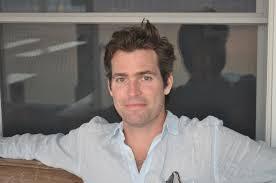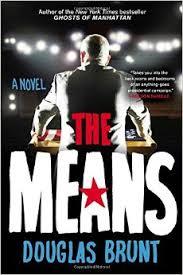Douglas Brunt's famous spouse, Megyn Kelly, may rule the roost at Fox News these days with her soaring ratings and tough questioning of guests, but Brunt is also making a name for himself as an author. Saying that he writes because "I love it," Brunt sold his security company and began to write on airplanes as a way to relax. Joking that he's "bringing back the martini lunch," after securing a literary agent and writing two books (Ghosts of Manhattan and The Means), Brunt continues to write in libraries and cafes all around New York City, favoring the 9 a.m. to 12 p.m. slot, when the kids are off at school and his wife is recovering from the previous evening's broadcast. The son of a Pennsylvania psychiatrist, Brunt writes from his unique vantage point as an insider in the worlds of politics and journalism.
Q: What was the inspiration for writing your new book, The Means?
A: A theme I'm obsessed with is the tension between human nature and the frameworks designed to curb the worst and promote the best of it. In my first book, Ghosts Of Manhattan, the setting was Wall Street and I explored the predictable nature of a bond trader inside the compensation scheme at Bear Stearns and the government regulations of Wall Street. That was about money. The Means is about power. I have access to political insiders who helped me write a portrait of the real day-to-day in politics which turned out to be crazier than Wall Street.
Q: What would you say is the overall message?
A: The book asks some important questions: Does high office attract good candidates who are corrupted by the process of attaining office and governing, or does it attract mostly flawed people to start with? Is human nature basically good or bad? Are our political and social frameworks effective? Can our frameworks survive the passage of time or does an aging democracy weaken and self-destruct? I don't pass judgements, but pose these questions in an interesting and informative story.
Q: Is Washington really dysfunctional or has it always been this way?
A: Washington isn't utterly dysfunctional. More like a functioning alcoholic. I agree with the Churchill quote that opens the book: 'democracy is the worst form of government, except for all the others we've ever tried'. America has achieved the peaceful transfer of power for more than two hundred years and forty-four leaders. That's unprecedented in the history of mankind, but, up close, it's still just as ugly as you might suspect.
Q: What advice would you have for reforming the political system?
A: The amount of energy and money required for campaigns is out of control. While a billion dollar campaign helps to pay media salaries, it's too much. These campaigns are also full of mudslinging, misinformation and become a distraction from governing the country. The main influence on voters should be a series of robust debates among the candidates. It's a free country so this is a tough problem to solve, but I'd love to see an election season with zero political ads and all voters had to decide based on watching four national debates over the two months leading to election day.
Q: Do you like politics?
A: I like it the way I like the NFL or a good book. Or watching curling during the Olympics.
Q: Would you ever run for office?
A: No. The people who run for high office are either saintly people who see a wrong and are willing to make enormous personal sacrifices for public service, or they're a little crazy. I'm neither a saint nor a crazy person.
Q: How are Washington and NY different?
A: DC is a small town with some big town features. The Capitol, Smithsonian, a few others. I think of it as a gentle town. New York is big, fast, energetic and has the most and best of everything. While it can push the senses, it's the most convenient place to live. It's much easier for a ninety-year-old to live in New York City than in the suburbs. NYC is the best mass assisted-living facility on the planet.
Q: What books are you thinking about writing next?
A: My next book is about a writer living in the suburbs where I lived for a time recently. I won't need to look far from my own experience for the research on that one. The book after that is about the human life cycle of elite athletics in America.
Q: Is New York City a good place to write?
A: The best place. It's the best place to observe a cross section of life. I discover new things every day and it's for this same reason that I love raising our kids here. When we think of all the incredible experiences we can feed to their little minds, the opportunities in New York are endless. It's the same dynamic when feeding my books.
Q: What is a typical day like for you?
A: I drop our two older kids at school then write at either the library or the Barnes & Noble cafe until noon. In the afternoon I do edits, research and play with the kids. When the kids are down, I have a drink and watch The Kelly File.
Q: Would you like to see the book become a film?
A: Feature film or TV series would be great.
Q: If so, what actors do you imagine in the roles?
A: Samantha Davis is the hero of the story. Jessica Biel would be perfect. Tom Pauley is the young GOP challenger for the White House. I can see Bradley Cooper or Ryan Gosling. Mitchel Mason is the incumbent president. Robert Downey Jr. has done some serious roles and would play this role great. Or Matthew Mcconaughey. I believe in the Mccon-aissance.


